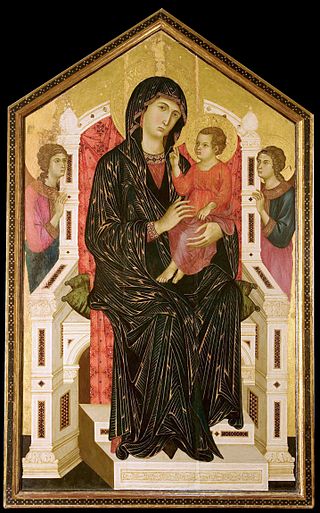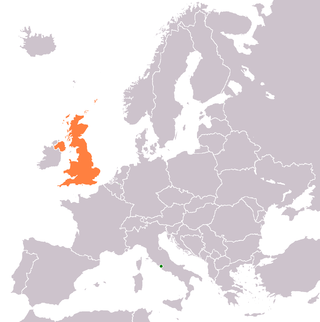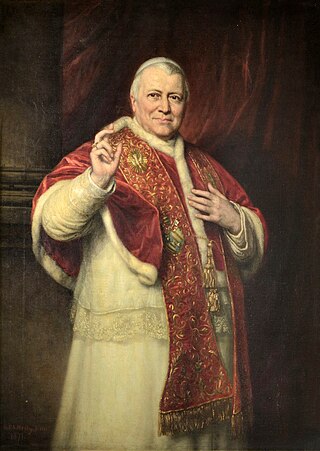Related Research Articles

A papal coronation is the formal ceremony of the placing of the papal tiara on a newly elected pope. The first recorded papal coronation was of Pope Nicholas I in 858. The most recent was the 1963 coronation of Paul VI, who soon afterwards abandoned the practice of wearing the tiara. To date, none of his successors have used the tiara, and their papal inauguration celebrations have included no coronation ceremony, although any future pope may elect to restore the use of the tiara at any point during his pontificate.

A papal conclave is a gathering of the College of Cardinals convened to elect a bishop of Rome, also known as the pope. Catholics consider the pope to be the apostolic successor of Saint Peter and the earthly head of the Catholic Church.

Catholic Mariology is Mariology in Catholic theology. According to the Immaculate Conception taught by the Catholic Church, she was conceived and born without sin, hence Mary is seen as having a singular dignity above the saints, receiving a higher level of veneration than all angelic spirits and blessed souls in heaven. Catholic Mariology thus studies not only her life but also the veneration of her in daily life, prayer, hymns, art, music, and architecture in modern and ancient Christianity throughout the ages.
An apostolic constitution is the most solemn form of legislation issued by the Pope.
Munificentissimus Deus is the name of an apostolic constitution written by Pope Pius XII. It defines ex cathedra the dogma of the Assumption of the Blessed Virgin Mary. It was the first ex-cathedra infallible statement since the official ruling on papal infallibility was made at the First Vatican Council (1869–1870). In 1854 Pope Pius IX made an infallible statement with Ineffabilis Deus on the Immaculate Conception of the Virgin Mary, which was a basis for this dogma. The decree was promulgated on 1 November 1950.
Exsul Familia is an apostolic constitution of Pope Pius XII on the topic of migration. It was released on 1 August 1952. The title of the document refers to the Holy Family, forced to flee into Egypt, taken as the archetype of every refugee family. Drawing upon Pope Leo XIII's Rerum Novarum, Exsul Familia presents emigration as a natural right.

Arcadio María Larraona Saralegui, C.M.F. was a Spanish cardinal of the Catholic Church. He served as prefect of the Sacred Congregation of Rites from 1962 to 1968, and was elevated to the cardinalate in 1959.

Federico Tedeschini was an Italian cardinal of the Holy Roman Church who served as papal datary in the Roman Curia from 1938 until his death, and was elevated to the cardinalate in 1933 in pectore by Pope Pius XI.
The Vatican Publishing House is a publisher established by the Holy See in 1926. It is responsible for publishing official documents of the Roman Catholic Church, including Papal bulls and encyclicals. On 27 June 2015, Pope Francis decreed that the Vatican Publishing House would eventually be incorporated into a newly established Secretariat for Communications in the Roman Curia.

Ad Caeli Reginam is an encyclical of Pope Pius XII, given at Rome, from St. Peter's Basilica, on the feast of the Maternity of the Blessed Virgin Mary, the eleventh day of October, 1954, towards the end of the Marian year, in the sixteenth year of his Pontificate. The encyclical is an important element of the Mariology of Pope Pius XII. It established the feast Queenship of Mary.

Fulgens corona is an encyclical by Pope Pius XII, given at St. Peter's, Rome, on 8 September 1953, the Feast of the Nativity of the Blessed Virgin Mary, in the fifteenth year of his Pontificate. The encyclical proclaims a Marian year for 1954, to commemorate the centenary of the definition of the dogma of the Immaculate Conception of the Virgin Mary.

The Mariology of the popes is the theological study of the influence that the popes have had on the development, formulation and transformation of the Roman Catholic Church's doctrines and devotions relating to the Blessed Virgin Mary.

Mariological papal documents have been a major force that has shaped Roman Catholic Mariology over the centuries. Mariology is developed by theologians on the basis not only of Scripture and Tradition but also of the sensus fidei of the faithful as a whole, "from the bishops to the last of the faithful", and papal documents have recorded those developments, defining Marian dogmas, spreading doctrines and encouraging devotions within the Catholic Church.

Le pèlerinage de Lourdes is the only encyclical of Pope Pius XII issued in French. It includes warnings against materialism on the centenary of the apparitions at Lourdes. It was given at Rome, from St. Peter's Basilica, on the feast of the Visitation of the Most Holy Virgin, July 2, 1957, the nineteenth year of his pontificate.

Holy See–United Kingdom relations are foreign relations between the Holy See and the United Kingdom.
Sponsa Christi is an Apostolic Constitution issued by Pope Pius XII on the Feast of the Presentation, November 21, 1950. It addresses the vocation of nuns to a life of virginity.

Papal infallibility is a dogma of the Catholic Church which states that, in virtue of the promise of Jesus to Peter, the Pope when he speaks ex cathedra is preserved from the possibility of error on doctrine "initially given to the apostolic Church and handed down in Scripture and tradition". It does not mean that the pope cannot sin or otherwise err in most situations. This doctrine, defined dogmatically at the First Vatican Council of 1869–1870 in the document Pastor aeternus, is claimed to have existed in medieval theology and to have been the majority opinion at the time of the Counter-Reformation.
The orders, decorations, and medals of the Holy See include titles, chivalric orders, distinctions and medals honoured by the Holy See, with the Pope as the fount of honour, for deeds and merits of their recipients to the benefit of the Holy See, the Catholic Church, or their respective communities, societies, nations and the world at large.
Ecclesiae Sanctae – "(Governing) of the Holy Church" – is an apostolic letter or motu proprio issued by Pope Paul VI on August 6, 1966. Paul wrote this letter on how to implement the Vatican Council, especially as regards the conciliar documents Christus Dominus, Presbyterorum Ordinis, Perfectae Caritatis, and Ad Gentes.
The following outline is provided as an overview of and topical guide to the canon law of the Catholic Church:
References
- ↑ "Pope Pius XII on Sodalities". University of Dayton eCommons. p. 9.
- ↑ "Christus Dominus". The Holy See. Retrieved 3 February 2024.
- ↑ Pope Pius XII (1952-08-01). "Exsul Familia Nazarethana". Papal Encyclicals. Retrieved 2023-03-02.
- ↑ "Munificentissimus Deus". The Holy See. Retrieved 3 February 2024.
- ↑ Skarda, Patricia. "Secular Institutes -- the vocation of the 21st century", The Boston Pilot, January 2, 2015
- ↑ "Pope Invites All Catholics to Rome for Holy Year". Catholic Herald Archive. Catholic Herald. 3 June 1949. Retrieved 3 February 2024.
- ↑ The Apostolic constitution, Sedes sapientiae and the General Statutes Annexed to it, on the Religious, Clerical, and Apostolic Training to be Imparted to Clerics in the States of Perfection to be Acquired. Catholic University of America Press. 1957. p. 10.
- ↑ "Sponsa Christi" (in Latin). The Holy See. Retrieved 3 February 2024.
